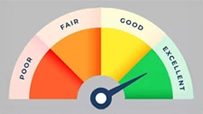Why You Could Receive Higher Interest on Tax Refunds in 2025
Disclaimer: The information provided herein is generic in nature. Ujjivan Small Finance Bank is not responsible for the accuracy of the information provided herein.
September 03, 2025

If you’re expecting a tax refund this year, here’s some good news, you might receive more than you originally anticipated. Thanks to the Income Tax Return (ITR) deadline extension for the assessment year 2024–25, the interest component on your tax refund could be higher than usual.
This blog breaks down how interest on tax refunds is calculated, why it may increase this year, and what you should keep in mind to make the most of it.
How Interest on Tax Refunds Works in India
Under Section 244A of the Income Tax Act, if the Income Tax Department owes you a refund (due to excess TDS, advance tax, or self-assessment tax), they also pay simple interest at 0.5% per month (or 6% annually) on the refund amount.
Here's a simplified view of how this interest on tax refunds is calculated:
You don’t have to do anything extra to claim this, the interest is automatically calculated and credited along with your refund.
The 2025 ITR Deadline Extension: Why It Matters
This year, the Central Board of Direct Taxes (CBDT) has extended the due date to file your ITR from July 31 to September 15, 2025.
What does this mean for you?
If you’re eligible for a refund and file your return before September 15, you’ll still be treated as an on-time filer — which means your interest will be calculated from April 1, not from your actual filing date.
This effectively gives taxpayers an extra 1.5 months’ worth of interest on their refund. Even though the monthly rate is modest (0.5%), over lakhs of taxpayers and crores of refund amounts, this difference can be meaningful.
Interest on Tax Refunds: How Much Extra Can You Get?
Let’s look at what this extra interest could mean in real money.
Since the interest rate is 0.5% per month, a two-month extension adds 1% extra interest on your refund amount. That may not sound like much but it adds up:
| Refund Amount | Interest (till July 31) | Interest (till Sept 15) | Extra Interest |
| ₹25,000 | ₹500 | ₹750 | ₹250 |
| ₹50,000 | ₹1,000 | ₹1,500 | ₹500 |
| ₹1,00,000 | ₹2,000 | ₹3,000 | ₹1,000 |
So, taxpayers who file anytime between August and mid-September are still eligible for interest from April 1, just like early filers — resulting in up to 33% higher interest in some cases.
Who Benefits the Most?
Not everyone will notice a big change — but some groups benefit more than others:
The extension isn’t just a time buffer, it could also be a financial perk.
What Do the Numbers Say? India’s Growing ITR Filing & Refund Trends
India’s tax base continues to grow rapidly — and with it, so do tax refunds and the interest attached to them. The most recent data shows a clear upward trend in ITR filings year over year. This is a good sign of increasing tax compliance and also proof that more taxpayers are eligible for refunds, and interest on those refunds is becoming a major talking point.
Let’s take a quick look:
| Assessment Year | ITRs Filed (Till Due Date) | Growth Compared to Previous Year |
| 2020–21 | 5.78 crore | — |
| 2021–22 | 5.77 crore | ↓ 0.17% |
| 2022–23 | 5.82 crore | ↑ 0.87% |
| 2023–24 | 6.77 crore | ↑ 16.3% |
| 2024–25 | 7.28 crore | ↑ 7.5% |
Additional Highlights (AY 2024–25):
With such high volumes and early processing underway, refund activity — and the interest on refunds — is expected to remain strong throughout the extended deadline window.
With the ITR deadline extension till September 15, 2025, this upward trend could continue, making it even more essential to file early and accurately to receive your refund (and the interest that comes with it) without delays.
Important Considerations
While it’s tempting to think of this as “free money,” there are a few things you should keep in mind:
The key is to file correctly and on time, not just to chase a few extra rupees.
How to Ensure You Get Your Interest on Tax Refunds
Here are a few simple steps to make sure you receive the full eligible refund interest:
A little attention now can prevent delays later and ensure your refund comes with the interest you’re owed.
Final Thoughts
The ITR deadline extension to September 15, 2025, is more than just a grace period — it’s a chance to earn extra interest on your tax refund, especially if you’re eligible for a sizeable refund. While the monthly rate may be modest, it’s still a financial advantage that rewards timely and accurate filing.
Just remember: while this is a bonus, your focus should always be on filing early, filing accurately, and staying compliant. That way, whether the refund interest is ₹100 or ₹10,000 — you won’t miss out.
Disclaimer:
The contents herein are only for informational purposes and generic in nature. The content does not amount to an offer, invitation or solicitation of any kind to buy or sell, and are not intended to create any legal rights or obligations. This information is subject to updation, completion, amendment and verification without notice. The contents herein are also subject to other product-specific terms and conditions, as well as any applicable third-party terms and conditions, for which Ujjivan Small Finance Bank assumes no responsibility or liability.
Nothing contained herein is intended to constitute financial, investment, legal, tax, or any other professional advice or opinion. Please obtain professional advice before making investment or any other decisions. Any investment decisions that may be made by the you shall be at your own sole discretion, independent analysis and evaluation of the risks involved. The use of any information set out in this document is entirely at the user’s own risk. Ujjivan Small Finance Bank Limited makes no representation or warranty, express or implied, as to the accuracy and completeness for any information herein. The Bank disclaims any and all liability for any loss or damage (direct, indirect, consequential, or otherwise) incurred by you due to use of or due to investment, product application decisions made by you on the basis of the contents herein. While the information is prepared in good faith from sources deemed reliable (including public sources), the Bank disclaims any liability with respect to accuracy of information or any error or omission or any loss or damage incurred by anyone in reliance on the contents herein, in any manner whatsoever.
To know more about Ujjivan Small Finance Bank Products Visit:"https://www.ujjivansfb.in"
All intellectual property rights, including copyrights, trademarks, and other proprietary rights, pertaining to the content and materials displayed herein, belong
to Ujjivan Small Finance Bank Limited or its licensors. Unauthorised use or misuse of any intellectual property, or other content displayed herein is strictly prohibited and the same is not intended for distribution to, or use by, any person in any jurisdiction where such distribution or use would (by reason of that person’s nationality, residence or otherwise) be contrary to law or registration or would subject Ujjivan Small Finance Bank Limited or its affiliates to any licensing or registration requirements.
FAQs
1. What is refund interest under Section 244A?
It’s interest paid by the Income Tax Department on excess tax paid by you — such as excess TDS or advance tax — at 0.5% per month.
2. From when is refund interest calculated?
If you file your ITR before the deadline, interest is calculated from April 1 of the assessment year until the refund date.
3. Why might refund interest be higher this year?
Because the ITR deadline is extended to September 15, 2025, more interest (up to 1% extra) accrues for those who file before this new deadline.
4. Is refund interest taxable?
Yes. Any interest received on your refund must be reported as ‘Income from Other Sources’ in your ITR.
5. How do I ensure I get the interest on tax refunds?
File before the deadline, e-verify quickly, and ensure your bank and PAN details are correct on the Income Tax Portal.
6. What happens if I file after September 15?
Interest on tax refunds will be calculated only from your actual filing date, not from April 1, reducing your total interest amount.
7. Will I get refund interest if I file on September 14?
Yes. Filing before the extended due date qualifies you for interest from April 1, 2025, provided the return is processed and refund is due.
8. Does everyone get interest on tax refunds automatically?
Only if there’s excess tax paid. If you’re not eligible for a refund, there’s no interest applicable.
9. Can I track refund interest separately?
Yes. In your refund intimation, you’ll see the refund amount and interest as separate line items.
10. Is there a maximum limit on refund interest?
There’s no cap, but it’s based on your refund amount, filing date, and time taken to process the refund.
Latest Blogs

Gold Loan LTV Ratio Explained (75% to 85%): What It Means for Borrowers
March 20, 2025
In June 2025, the Reserve Bank of India (RBI) introduced a significant relaxation for gold loan borrowers: the maximum Loan-to-Value (LTV) ratio for loans below ₹2.5 lakh was raised to 85%, up from the long-standing cap of 75%. Loans between ₹2.5 lakh and ₹5 lakh can now go up to 80%, while loans above ₹5 lakh continue under the 75% ceiling.

Good Debt vs Bad Debt: Learn the Difference
August 13, 2025
Every month, millions of Indians wait for the familiar debit alert, an EMI deducted from their account.

Got a Tax Refund? 5 Smart Ways to Put Your 2025 Refund to Work
August 13, 2025
For many taxpayers, there’s a unique sense of relief when a tax refund arrives.

Credit Score Not Improving? 5 Mistakes You Might Be Making
August 13, 2025
For most of us, a credit score feels like a silent judge sitting in the background of our financial lives.

Banking Jargon Decoded: 15 Key Terms You Should Know
May 13, 2025
Banking feels simple on the surface; deposit money, withdraw when needed, pay bills, or transfer funds.


